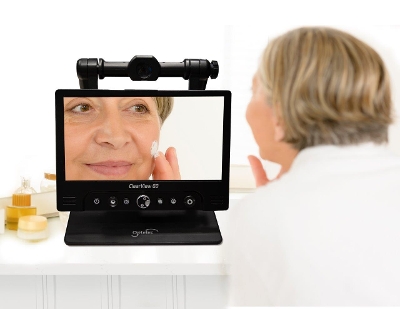Bringing awareness to women’s eye health is an important issue. According to the Women’s Eye Health organization two-thirds of people with a visual impairment are women. There are many factors that contribute to women being more susceptible to poor eye health and eye diseases. Being aware of these factors can help you take preventative measures.
Pregnancy or Hormonal Changes - While pregnant make sure to consult with your eye care professional. Changes in hormones during pregnancy may cause varying eye conditions such as dry eye, double vision, blurry vision, sensitivity to light, temporary loss of vision, and seeing spots. Talking to your doctor about these symptoms can help prevent permanent eye damage.
Makeup – Eye makeup can contribute to dirt or bacteria entering your eye. This can cause redness or discomfort and can lead to an eye infection. When applying makeup ensure your hands and any brushes or applicators are clean. Avoid putting on mascara or eye shadow in a moving vehicle; you may poke or scratch your eye. If you have low vision, try using assistive aids when applying your makeup, such as the Optelec ClearView GO. This will help you see your facial features clearly and help prevent additional damage to your eyes.

Life Expectancy – According to a recent study by the Centers for Disease Control and Prevention (CDC), women outlive men by almost 5 years. A longer life expectancy also means a higher reporting rate of age-related eye diseases among women. Taking care of your eyes before your vision starts to deteriorate is vital. It can help to prevent or slow down the effects of hereditary or age-related eye conditions.
5 Ways to Protect Your Vision
- Annual Eye Exams – Visiting your eye care professional annually will help you catch any problems early so they can be addressed and treated. A comprehensive eye exam will allow your doctor to see early signs of chronic conditions.
- Quit Smoking – According to the American Academy of Ophthalmology, smoking can increase your risk of developing age-related macular degeneration, cataract, and optic nerve damage, and other eye conditions that can lead to impaired vision.
- Wear Your Shades – Wearing sunglasses reduces exposure to ultraviolet light which can cause cataracts and macular degeneration. When you are going outside, whether it is sunny or not, don’t forget to grab your UV protective sunglasses. Even if you have prescription glasses, wearing a pair of fit-over lenses is important to maintaining your eye health.
- Eat for Healthy Vision – Eating a diet full of fresh fruits, vegetables, and fish can contribute to healthy eyes. Omega-3 fatty acids, vitamins C, E, and A, lutein, beta carotene, and zinc are all important nutrients that your eyes need to combat eye diseases.
- Family History – Knowing your family history can help you take preventative measures when it comes to your health. If your family has a history of age-related macular degeneration or glaucoma, let your doctor know. Focus on your eye health and ways you can prevent or slow the development of these eye conditions.
Learning more about eye health and eye diseases and applying this information to your life will help your eyes stay healthy for years to come. If you or someone you know is living with low vision, connect with us to learn more about the tools that will help you remain independent.
Apr 20, 2021


